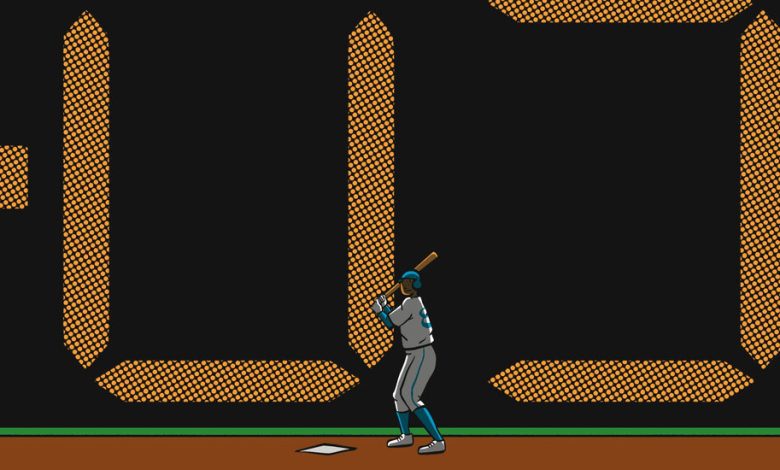Baseball Has Become Micromanaged, Like Everything Else in Our Lives

The playoffs are upon us, and this year Major League Baseball likes to think of itself as having a lot to cheer about. Regular-season attendance for games and viewership on TV are the highest they’ve been in years, a result, many people say, of bold changes to the game’s rules: bigger bases to encourage more stealing (read: action), the intentional walk rule (which eliminates the staging of four outside lobs from pitcher to catcher) and the prohibition on pitchers’ throwing to first base as often when a runner’s on.
But the rule change that has gotten the most attention and has had perhaps the biggest impact on the game is the addition of a pitch clock. M.L.B. seems to feel that, with the pitch clock, it has saved baseball from irrelevance.
But popularity isn’t the only measure of the game’s health. In various ways, the rule changes have introduced time to a sport that had always stood well outside of it.
It seems to have come to a head this season: I can’t shake the feeling that the pitch clock and related rule changes amount to a blemish on baseball’s opposition to time itself.
Baseball is a game of turns, not time. It argues for a different metaphysics (“catching rhythms,” Quincy Troupe calls it, or as Gail Mazur puts it, a “firm structure with the mystery / of accidents”) that absconds from our universe of time, even if only for the duration of an illusion on a summer afternoon. With the new rules and particularly the new pitch clock, the game has become one less place in our subdivided lives in which we get to imagine — to feel, to daydream — something existing outside of time.
Even the theater of the performed four-pitch intentional walk had an idiosyncrasy about it so true to baseball, and to being human. It was a modest digression in the course of an inning, a silly little dance. It was interesting to see if the batter would take a wild swing at one or if the pitcher would go lazy and throw a comically wild pitch or — more beautiful and rare — if he’d catch the batter sleeping and sneak a zinging, disorienting strike down the middle of the plate. The whole affair would add a minute or two to a game.
The pitch clock is the biggest modification to the game in years: With nobody on base, pitchers have 15 seconds to wind up and throw. With a runner on, the pitcher has 20 seconds. If pitcher or batter is not ready by the appointed second, the penalty is a ball or strike, depending on which side is getting penalized.
One pitch clock incident this summer stands out to me. There’s no better baseball weather in the world than Oakland in September. We were in the top half of the eighth, the A’s beating the Angels 6-0, when Shohei Ohtani, a rare star at both pitching and hitting, stepped to the plate. It felt as if there were more Ohtani fans in the stands than A’s fans.
On this night we’d arrived at his last trip to the plate, and excitement swept through the crowd. The count went to 3-2. Two out, nothing on the line, since it was a rout, but still, fans got on their feet. The pitcher stared home. And how did this minor showdown end? With a clock violation by the pitcher, awarding Ohtani ball four and first base. You could hear the disappointment in the groans from A’s and Ohtani fans alike. It was a sad, boring — and judging from the boos, irritating — way to end the night for the game’s greatest player.
Some of the arguments against the pitch clock are still developing and could be quite serious in their own right, like reports this season that speeding pitchers up may lead to more injuries. The league disputes this, but time will tell.
Some catchers, batters and umpires, meanwhile, have grumbled that the pressure they now feel has meant less chitchat at the plate, less small talk, a little less congeniality. “It’s all business” at home plate now, said San Francisco Giants outfielder Joc Pederson in April. Trivial as chitchat might sound, the intangible, unquantifiable impacts on the game like this are the ones I find most striking — the feeling that the oddities of the sport are being sanded away or that the game is speeding by or that you’re being rushed out of the stadium, hastened along in your pleasure.
Most of all, I get the feeling that a languorous 19th-century invention — baseball — is being forced to fit a 21st-century pace of life. Most days, most places, I already feel rushed, sensing, as Andrew Marvell wrote, “time’s wingèd chariot hurrying near.” Now I have to feel that at the ballpark, too?
“Baseball games end in their own terms; they do not end because a clock runs out,” wrote Gilbert Sorrentino years ago. Now he’s a little less right about that. “In football,” he said, “if one team is four touchdowns behind with 10 seconds to play, the football game is over, truly, though officially it is not.” His description of what happens in football (or basketball or soccer) describes what’s been happening this summer on baseball diamonds: “Invented time imposes itself on the game and affects its patterns.”
It’s not just the pitch clock. In recent years, Major League Baseball has been hurrying us out of the ballpark in other ways. In 2017 it turned the intentional walk into a mere hand gesture, and in 2020 the boys upstairs decreed that when a game went to extra innings, each half inning was to begin with a runner already on second base. Pitchers have to start extra innings as if they’d just given up a double. I’ve heard fans call this runner at second base “Manfred’s man” or “the Manfred man,” after the league commissioner, Rob Manfred, who’s been a driver behind many of these changes.
Manfred’s man has dramatically reduced the number of games going beyond 10 or 11 innings. But it’s a rule change that deflates the earned excitement toward which a baseball game beautifully builds, particularly a tie game. It’s like skipping to the good parts in a great novel. I dislike but understand the need for a shootout in a tied soccer match, when players are utterly out of gas and can’t run anymore. But if protecting baseball players is the concern here, why not play 10 or 20 fewer games a season? Then we wouldn’t have to deal with the oxymoron of baseball in Boston in November.
Not only do these changes smack of micromanagement and a corporate fixation with flattening and sanitizing in the name of efficiency, but they’re also anti-poetic — something we do not need in these prosaic times.
What we need is what Robert Frost called a “momentary stay against confusion” — poetry — and its disregard for time, its lyric respite from it, not a speeding up, not more life on the clock.
Everything in the game is standardized down to the inch, but baseball fields, even in the pros, have no set distance for the outfield fence line, and this fact has a parallel in the way a game could, in theory, go on forever.
“I don’t care if I never get back,” we sing every seventh-inning stretch. The pitch clock is a betrayal of the game’s sacred creed.
Jesse Nathan, a poet who teaches literature at the University of California, Berkeley, is the author of “Eggtooth.”
The Times is committed to publishing a diversity of letters to the editor. We’d like to hear what you think about this or any of our articles. Here are some tips. And here’s our email: [email protected].
Follow The New York Times Opinion section on Facebook, Twitter (@NYTopinion) and Instagram.




